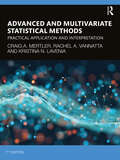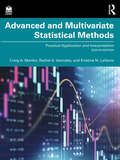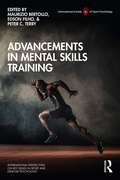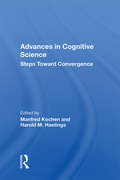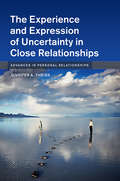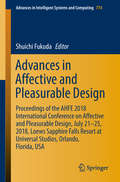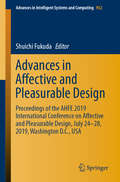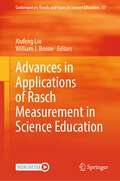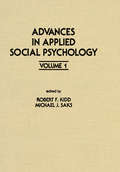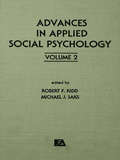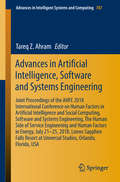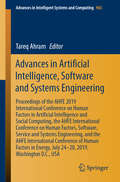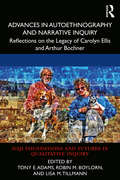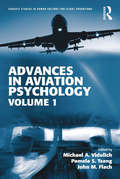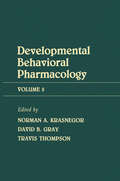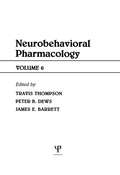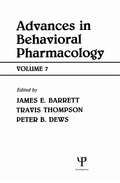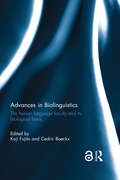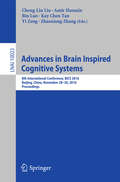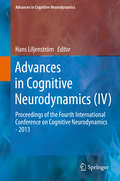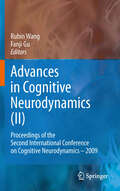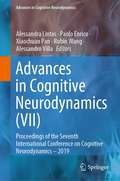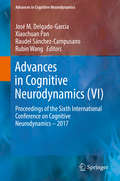- Table View
- List View
Advanced Techniques for Counseling and Psychotherapy
by Christian ContePresents counseling and psychotherapy techniques. This book provides practical applications of counseling theories, including clinical case examples.
Advanced and Multivariate Statistical Methods: Practical Application and Interpretation
by Craig A. Mertler Rachel A. Vannatta Kristina N. LaVeniaAdvanced and Multivariate Statistical Methods, Seventh Edition provides conceptual and practical information regarding multivariate statistical techniques to students who do not necessarily need technical and/or mathematical expertise in these methods. This text has three main purposes. The first purpose is to facilitate conceptual understanding of multivariate statistical methods by limiting the technical nature of the discussion of those concepts and focusing on their practical applications. The second purpose is to provide students with the skills necessary to interpret research articles that have employed multivariate statistical techniques. Finally, the third purpose of AMSM is to prepare graduate students to apply multivariate statistical methods to the analysis of their own quantitative data or that of their institutions. New to the Seventh Edition All references to SPSS have been updated to Version 27.0 of the software. A brief discussion of practical significance has been added to Chapter 1. New data sets have now been incorporated into the book and are used extensively in the SPSS examples. All the SPSS data sets utilized in this edition are available for download via the companion website. Additional resources on this site include several video tutorials/walk-throughs of the SPSS procedures. These "how-to" videos run approximately 5–10 minutes in length. Advanced and Multivariate Statistical Methods was written for use by students taking a multivariate statistics course as part of a graduate degree program, for example in psychology, education, sociology, criminal justice, social work, mass communication, and nursing.
Advanced and Multivariate Statistical Methods: Practical Application and Interpretation
by Craig A. Mertler Rachel A. Vannatta Kristina N. LaVeniaAdvanced and Multivariate Statistical Methods, Eighth Edition, offers conceptual and practical insights into multivariate statistical techniques, designed for students without requiring deep technical or mathematical expertise.This updated text facilitates conceptual understanding of multivariate statistical methods by limiting the technical nature of the discussion of those concepts and focusing on their practical applications. It equips students with the tools to critically evaluate research articles that utilize these techniques and prepares graduate students to apply multivariate methods in analyzing their own quantitative data or that of their institutions.This new edition has resources for instructors and students, including an online test bank, downloadable data sets, and “how to” videos of the SPSS procedures, available via the companion website (www.routledge.com/cw/mertler) and signposted throughout the book for easy reference. A brief discussion of practical significance has also been added to Chapter 1.This book is tailored for students taking a multivariate statistics course in graduate programs across a range of fields, including psychology, education, sociology, criminal justice, social work, mass communication, and nursing.
Advancements in Mental Skills Training (ISSP Key Issues in Sport and Exercise Psychology)
by Edson Filho Peter C. Terry Maurizio BertolloAdvancements in Mental Skills Training presents contemporary evidence-based intervention approaches from leading sport psychology researchers and practitioners. The book comprehensively examines the use of mental skills training for athletic performance and well-being from a cross-cultural perspective. It begins by introducing theoretical advancements related to mental toughness, cultural factors, performance optimisation and mindfulness. It goes on to examine the technological advancements related to mental skills training, outlining how mobile technologies can be used to measure and train perceptual-cognitive skills, and the effectiveness of virtual reality in mental training. The book concludes by discussing emerging topics, such as how sports psychology can incorporate spirituality, minority groups in sport and the impact of prejudice, and referee career development. This insightful text introduces the potential for sport psychology to be integrated into our daily functioning and provides strategies for athletes to optimize their performance and bolster their mental health. It will be an essential read for all sport psychology researchers as well as professionals working in the field.
Advances In Cognitive Science: Steps Toward Convergence
by Manfred Kochen Harold M. HastingsThis book includes a collection of papers on both natural (biological) and artificial (computer) approaches to several facets of intelligent behavior from the primary viewpoint of the convergence of computer science and biology in the theory of cognitive science. .
Advances In Personal Relationships: The Experience and Expression of Uncertainty in Close Relationships (Advances in Personal Relationships)
by Jennifer A. TheissClose relationships are an important and desired aspect of the human experience; but as individuals pursue intimacy and connection with others, they will encounter a variety of questions about the nature, status, and future of their relationships. Consequently, uncertainty is an inevitable and unavoidable element of close relationships. It can arise in response to a variety of relational circumstances and can shape the ways that partners think, feel, and act toward one another. This book summarizes the expansive body of theoretical and empirical research regarding the nature of uncertainty, the conditions that promote uncertainty about relational involvement, and the emotional, cognitive, and communicative outcomes of uncertainty for individuals and their relationships. Based on the robust accumulation of data about uncertainty in close relationships, the book also offers recommendations for coping with ambiguous relational circumstances and proposes new directions for conceptualizing and studying uncertainty in close relationships.
Advances and Techniques in Restoration Therapy
by Terry D. Hargrave Nicole E. Zasowski Miyoung Yoon HammerAdvances and Techniques in Restoration Therapy focuses on the practical elements of the Restoration Therapy Model to help mental health professionals working with individuals, couples, and families, to restore broken identities and senses of safety, and to move toward action that is functional and healing. Richly illustrated with case examples from experienced clinicians, this volume brings new insights and a range of established and emerging therapeutic techniques to the framework and Restoration Therapy community. This is an innovative and much-needed step-by-step manual, which will provide marriage and family therapists and counselors with practical ways of applying key interventions to varied situations of pain, to help clients find functional, healing solutions with integrity.
Advances in Affective and Pleasurable Design: Proceedings of the AHFE 2018 International Conference on Affective and Pleasurable Design, July 21-25, 2018, Loews Sapphire Falls Resort at Universal Studios, Orlando, Florida, USA (Advances in Intelligent Systems and Computing #774)
by Shuichi FukudaThis book discusses the latest advances in affective and pleasurable design. Further, it reports on important theoretical and practical issues, covering a wealth of topics including aesthetics in product and system design, design-driven innovation, affective computing, evaluation tools for emotion, Kansei engineering for products and services, and many more. Based on the AHFE 2018 International Conference on Affective and Pleasurable Design, held on July 21–25, 2018, in Orlando, Florida, USA, the book provides a timely survey and inspiring guide for all researchers and professionals involved in design, e.g. industrial designers, emotion designers, ethnographers, human–computer interaction researchers, human factors engineers, interaction designers, mobile product designers, and vehicle system designers.
Advances in Affective and Pleasurable Design: Proceedings of the AHFE 2019 International Conference on Affective and Pleasurable Design, July 24-28, 2019, Washington D.C., USA (Advances in Intelligent Systems and Computing #952)
by Shuichi FukudaThis book discusses the latest advances in affective and pleasurable design. It reports on important theoretical and practical issues, covering a wealth of topics including aesthetics in product and system design, design-driven innovation, affective computing, evaluation tools for emotion, Kansei engineering for products and services, and many more. Based on papers presented at the AHFE 2019 International Conference on Affective and Pleasurable Design, held on July 24–28, 2019, in Washington DC, USA, the book provides an inspiring guide for all researchers and professionals in the field of design, e.g. industrial designers, emotion designers, ethnographers, human–computer interaction researchers, human factors engineers, interaction designers, mobile product designers, and vehicle system designers.
Advances in Applications of Rasch Measurement in Science Education (Contemporary Trends and Issues in Science Education #57)
by Xiufeng Liu William J. BooneThis edited volume presents latest development in applications of Rasch measurement in science education. It includes a conceptual introduction chapter and a set of individual chapters. The introductory chapter reviews published studies applying Rasch measurement in the field of science education and identify important principles of Rasch measurement and best practices in applications of Rasch measurement in science education. The individual chapters, contributed by authors from Canada, China, Germany, Philippines and the USA, cover a variety of current topics on measurement concerning science conceptual understanding, scientific argumentation, scientific reasoning, three-dimensional learning, knowledge-in-use and cross-cutting concepts of the Next Generation Science Standards, medical education learning experiences, machine-scoring bias, formative assessment, and teacher knowledge of argument. There are additional chapters on advances in Rasch analysis techniques and technology including R, Bayesian estimation, comparison between joint maximum likelihood (JML) and marginal maximum likelihood (MML) estimations on model-data-fit, and enhancement to Rasch models by Cognitive Diagnostic Models and Latent Class Analysis. The volume provides readers who are new and experienced in applying Rasch measurement with advanced and exemplary applications in the forefront of various areas of science education research.
Advances in Applied Social Psychology: Volume 1 (Applied Psychology Series)
by Michael J. Saks Robert F. KiddFirst published in 1980. Routledge is an imprint of Taylor & Francis, an informa company.
Advances in Applied Social Psychology: Volume 2 (Applied Psychology Series)
by ROBERT F. KIDD and MICHAEL J. SAKSFirst Published in 1983. This volume is the second in a series of volumes on applied social psychology. The contents of the contributions represent the richly diverse approaches and settings in which social psychology is being used. In preparing their chapters, the contributors were asked to focus on how social psychologists,' as scientists and advocates, could contribute to the resolution of the debates that often surround important social problems. Each author was asked to place his or her attempts to use social psychological knowledge in the context of his or her own specific problem. If one consistent theme emerges from this collection, it is the emphasis on employing social psychology to enlighten and understand decisions at the level of public policy. This book is a vital display of how existing literature and methods in the field can work to illuminate and inform issues of national and even international importance.
Advances in Artificial Intelligence, Software and Systems Engineering: Joint Proceedings of the AHFE 2018 International Conference on Human Factors in Artificial Intelligence and Social Computing, Software and Systems Engineering, The Human Side of Service Engineering and Human Factors in Energy, July 21–25, 2018, Loews Sapphire Falls Resort at Universal Studios, Orlando, Florida, USA (Advances in Intelligent Systems and Computing #787)
by Tareq Z. AhramThis book focuses on emerging issues following the integration of artificial intelligence systems in our daily lives. It focuses on the cognitive, visual, social and analytical aspects of computing and intelligent technologies, highlighting ways to improve technology acceptance, effectiveness, and efficiency. Topics such as responsibility, integration and training are discussed throughout. The book also reports on the latest advances in systems engineering, with a focus on societal challenges and next-generation systems and applications for meeting them. It also discusses applications in smart grids and infrastructures, systems engineering education as well as defense and aerospace. The book is based on both the AHFE 2018 International Conference on Human Factors in Artificial Intelligence and Social Computing, Software and Systems Engineering, The Human Side of Service Engineering and Human Factors in Energy, July 21–25, 2018, Loews Sapphire Falls Resort at Universal Studios, Orlando, Florida, USA.
Advances in Artificial Intelligence, Software and Systems Engineering: Proceedings of the AHFE 2019 International Conference on Human Factors in Artificial Intelligence and Social Computing, the AHFE International Conference on Human Factors, Software, Service and Systems Engineering, and the AHFE International Conference of Human Factors in Energy, July 24-28, 2019, Washington D.C., USA (Advances in Intelligent Systems and Computing #965)
by Tareq AhramThis book addresses emerging issues resulting from the integration of artificial intelligence systems in our daily lives. It focuses on the cognitive, visual, social and analytical aspects of computing and intelligent technologies, highlighting ways to improve the acceptance, effectiveness, and efficiency of said technologies. Topics such as responsibility, integration and training are discussed throughout. The book also reports on the latest advances in systems engineering, with a focus on societal challenges and next-generation systems and applications for meeting them. The book is based on two AHFE 2019 Affiliated Conferences – on Artificial Intelligence and Social Computing, and on Service, Software, and Systems Engineering –, which were jointly held on July 24–28, 2019, in Washington, DC, USA.
Advances in Autoethnography and Narrative Inquiry: Reflections on the Legacy of Carolyn Ellis and Arthur Bochner (International Congress of Qualitative Inquiry (ICQI) Foundations and Futures in Qualitative Inquiry)
by Tony E. AdamsAdvances in Autoethnography and Narrative Inquiry pays homage to two prominent scholars, Arthur Bochner and Carolyn Ellis, for their formative and formidable contributions to autoethnography, personal narrative, and alternative forms of scholarship. Their autoethnographic—and life—project gives us tools for understanding shared humanity and precious diversity; for striving to become ever-more empathic, loving, and ethical; and for living our best creative, relational, and public lives. The collection is organized into two sections: "Foundations" and "Futures." Contributors to "Foundations" explore Carolyn and Art’s scholarship and legacy and/or their singular presence in the author’s life. Contributors to "Futures" offer novel and innovative applications of autoethnographic and narrative inquiry. Throughout, contributors demonstrate how Bochner’s and Ellis’ work has created and shifted the terrain of autoethnographic and narrative research. This collection will be of interest to researchers familiar with Bochner’s and Ellis’ research. It also serves as a resource for graduate students, scholars, and professionals who have an interest in autoethnographic and narrative research. This collection can be used in upper-division undergraduate courses and graduate courses solely about autoethnography and narrative, and as a secondary text for courses about ethnography and qualitative research.
Advances in Aviation Psychology: Volume 1 (Ashgate Studies in Human Factors for Flight Operations #1)
by Michael A. VidulichAviation remains one of the most active and challenging domains for human factors and applied psychology. Since 1981, the biennial International Symposium on Aviation Psychology (ISAP) has been convened for the purposes of (a) presenting the latest research on human performance problems and opportunities within aviation systems, (b) envisioning design solutions that best utilize human capabilities for creating safe and efficient aviation systems, and (c) bringing together scientists, research sponsors, and operators in an effort to bridge the gap between research and application. Though rooted in the presentations of the 17th ISAP, held in 2013 in Dayton, Ohio, Advances in Aviation Psychology is not simply a collection of selected proceeding papers. Based upon the potential impact on emerging trends, current debates or enduring issues present in their work, select authors were invited to expand on their work following the benefit of interactions at the symposium. The invited authors include the featured keynote and plenary speakers who are all leading scientists and prominent researchers that were selected to participate at the symposium. These contributions are supplemented by additional contributors whose work best reflects significant developments in aviation psychology. Consequently the volume includes visions for the next generation of air management and air traffic control, the integration of unmanned (i.e. remotely piloted vehicles) into operational air spaces, and the use of advanced information technologies (e.g. synthetic task environments) for research and training. This book is the first in a series of volumes to be published in conjunction with each subsequent ISAP. The aim of each volume is not only to report the latest findings in aviation psychology but also to suggest new directions for advancing the field.
Advances in Behavioral Pharmacology: Volume 5: Developmental Behavioral Pharmacology
by David B. Gray Travis Thompson Norman A. KrasnegorFirst published in 1986. This monograph is based on a conference sponsored by the Human Learning and Behavior Branch of the National Institute of Child Health and Human Development, NIH. The meeting that was held at the Xerox Center in Leesburg, Virginia, in August 1983, brought together a group of leading researchers for the purpose of providing an overview of the emerging field of developmental behavioral pharmacology. More specifically, as is evidenced by the chapters in this volume, the intent was to put the field into historical perspective, render a working definition, and outline strategies and tactics for conducting behavioral pharmacological research in the developing organism.
Advances in Behavioral Pharmacology: Volume 6: Neurobehavioral Pharmacology
by Travis Thompson Peter B. Dews James E. BarrettFirst published in 1987. Routledge is an imprint of Taylor & Francis, an informa company.
Advances in Behavioral Pharmacology: Volume 7 (Issn Ser. #Volume 3)
by James E. Barrett Travis Thompson Peter B. DewsThis volume continues to document and summarize developments, trends, and emergent interdisciplinary research in behavioral psychopharmacology. For researchers and graduate students in psychopharmacology, behavioral pharmacology, toxicology, and the neurosciences. This seventh volume continues to document and summarize developments, trends, and emergent interdisciplinary research in behavioral psychopharmacology. For researchers and graduate students in psychopharmacology, behavioral pharmacology, toxicology, and the neurosciences. This is the latest volume in a series that continues to document and summarize developments, trends, and emergent interdisciplinary research in behavioral pharmacology, psychopharmacology, and the neurosciences. The chapters, written by authorities in their respective research areas, provide up-to-date examination and analysis of dominant evolving research areas. Designed as a resource text for professionals, as well as a supplementary text for upper level undergraduate and graduate students of behavioral pharmacology, psychopharmacology, psychobiology, and related fields, this book, like the others in the Advances in Behavioral Pharmacology Series, provides comprehensive coverage unavailable elsewhere.
Advances in Biolinguistics: The Human Language Faculty and Its Biological Basis
by Koji Fujita and Cedric BoeckxBiolinguistics is a highly interdisciplinary field that seeks the rapprochement between linguistics and biology. Linking theoretical linguistics, theoretical biology, genetics, neuroscience and cognitive psychology, this book offers a collection of chapters situating the enterprise conceptually, highlighting both the promises and challenges of the field, and chapters focusing on the challenges and prospects of taking interdisciplinarity seriously. It provides concrete illustrations of some of the cutting-edge research in biolinguistics and piques the interest of undergraduate students looking for a field to major in and inspires graduate students on possible research directions. It is also meant to show to specialists in adjacent fields how a particular strand of theoretical linguistics relates to their concerns, and in so doing, the book intends to foster collaboration across disciplines. Chapter 1 of this book is freely available as a downloadable Open Access PDF at http://www.taylorfrancis.com under a Creative Commons Attribution-Non Commercial-No Derivatives (CC-BY-NC-ND) 4.0 license.
Advances in Brain Inspired Cognitive Systems: 8th International Conference, BICS 2016, Beijing, China, November 28-30, 2016, Proceedings (Lecture Notes in Computer Science #10023)
by Amir Hussain Yi Zeng Cheng-Lin Liu Bin Luo Kay Chen Tan Zhaoxiang ZhangThis book constitutes the refereed proceedings of the 8th International Conference on Brain Inspired Cognitive Systems, BICS 2016, held in Beijing, China, in November 2016. The 32 full papers presented were carefully reviewed and selected from 43 submissions. They discuss the emerging areas and challenges, present the state of the art of brain-inspired cognitive systems research and applications in diverse fields by covering many topics in brain inspired cognitive systems related research including biologically inspired systems, cognitive neuroscience, models consciousness, and neural computation.
Advances in Cognitive Neurodynamics: Proceedings of the Fourth International Conference on Cognitive Neurodynamics - 2013 (Advances in Cognitive Neurodynamics)
by Hans LiljenströmThis volume is the proceedings of the 4th International Conference on Cognitive Neurodynamics (ICCN2013) held in Sweden in 2013. The included papers reflect the large span of research presented and are grouped in ten parts that are organized essentially in a top-down structure. The first parts deal with social/interactive (I) and mental (II) aspects of brain functions and their relation to perception and cognition (III). Next, more specific aspects of sensory systems (IV) and neural network dynamics of brain functions (V), including the effects of oscillations, synchronization and synaptic plasticity (VI), are addressed, followed by papers particularly emphasizing the use of neural computation and information processing (VII). With the next two parts, the levels of cellular and intracellular processes (VIII) and finally quantum effects (IX) are reached. The last part (X) is devoted to the contributions invited by the Dynamic Brain Forum (DBF), which was co-organized with ICCN2013.
Advances in Cognitive Neurodynamics: Proceedings of the Second International Conference on Cognitive Neurodynamics - 2009 (Advances in Cognitive Neurodynamics)
by Fanji Gu Rubin WangWithin our knowledge, the series of the International Conference on Cognitive Neurodynamics (ICCN) is the only conference series dedicating to cognitive neurodynamics. This volume is the proceedings of the 2nd International Conference on Cognitive Neurodynamics held in 2009, which reviews the progress in this field since the 1st ICCN -2007. The topics include: Neural coding and realistic neural network dynamics, Neural population dynamics, Firing Oscillations and Patterns in Neuronal Networks, Brain imaging, EEG, MEG, Sensory and Motor Dynamics, Global cognitive function, Multi-scalar Neurodynamics - from Physiology to Systems Theory, Neural computing, Emerging Technologies for Brain Computer Interfaces, Neural dynamics of brain disorders.
Advances in Cognitive Neurodynamics: Proceedings of the Seventh International Conference on Cognitive Neurodynamics – 2019 (Advances in Cognitive Neurodynamics)
by Rubin Wang Xiaochuan Pan Alessandra Lintas Paolo Enrico Alessandro VillaThis book contains original articles submitted to the Seventh International Conference on Cognitive Neurodynamics (ICCN 2019). The brain is an endless case study of a complex system characterized by multiple levels of integration, multiple time scales of activity, and multiple coding and decoding properties. The contribution of several disciplines, mathematics, physics, computer science, neurobiology, pharmacology, physiology, and behavioral and clinical sciences, is necessary in order to cope with such seemingly unattainable complexity that transforms the experimental information into a tricky puzzle which hides the correspondence with model predictions. This conference gathered active participants to discuss ideas and pose new questions from different viewpoints, ranging from single neurons and neural networks to animal/human behavior in theoretical and experimental studies. The conference is organized with plenary lectures, mini-symposia, interdisciplinary round tables, and oral and poster sessions.
Advances in Cognitive Neurodynamics: Proceedings of the Sixth International Conference on Cognitive Neurodynamics – 2017 (Advances in Cognitive Neurodynamics)
by Rubin Wang Xiaochuan Pan José M. Delgado-García Raudel Sánchez-CampusanoThis proceedings contains articles submitted to the sixth International Conference on Cognitive Neurodynamics (ICCN2017). The Meeting included plenary lectures, specialized symposia, and posters presentations. The main topics of the meeting addressed the general substrates underlying neural functions and the neural dynamics in sensory, motor, and cognitive systems. Other important neuroscience fields covered in the meeting were learning and memory processes and the functionally-related changes in synaptic strength, neural oscillations, synchronizations and coherence activities between different neural circuits, and the imaging of cognitive networks. Finally, specific articles covered several fields related to neural computation and neuroengineering, the modelling higher-order functions and dysfunctions and the experimental design of brain-to-computer and brain-to-brain interactions. All articles were peer-reviewed. The ICCN is a series conference that takes place every two years since 2007.

